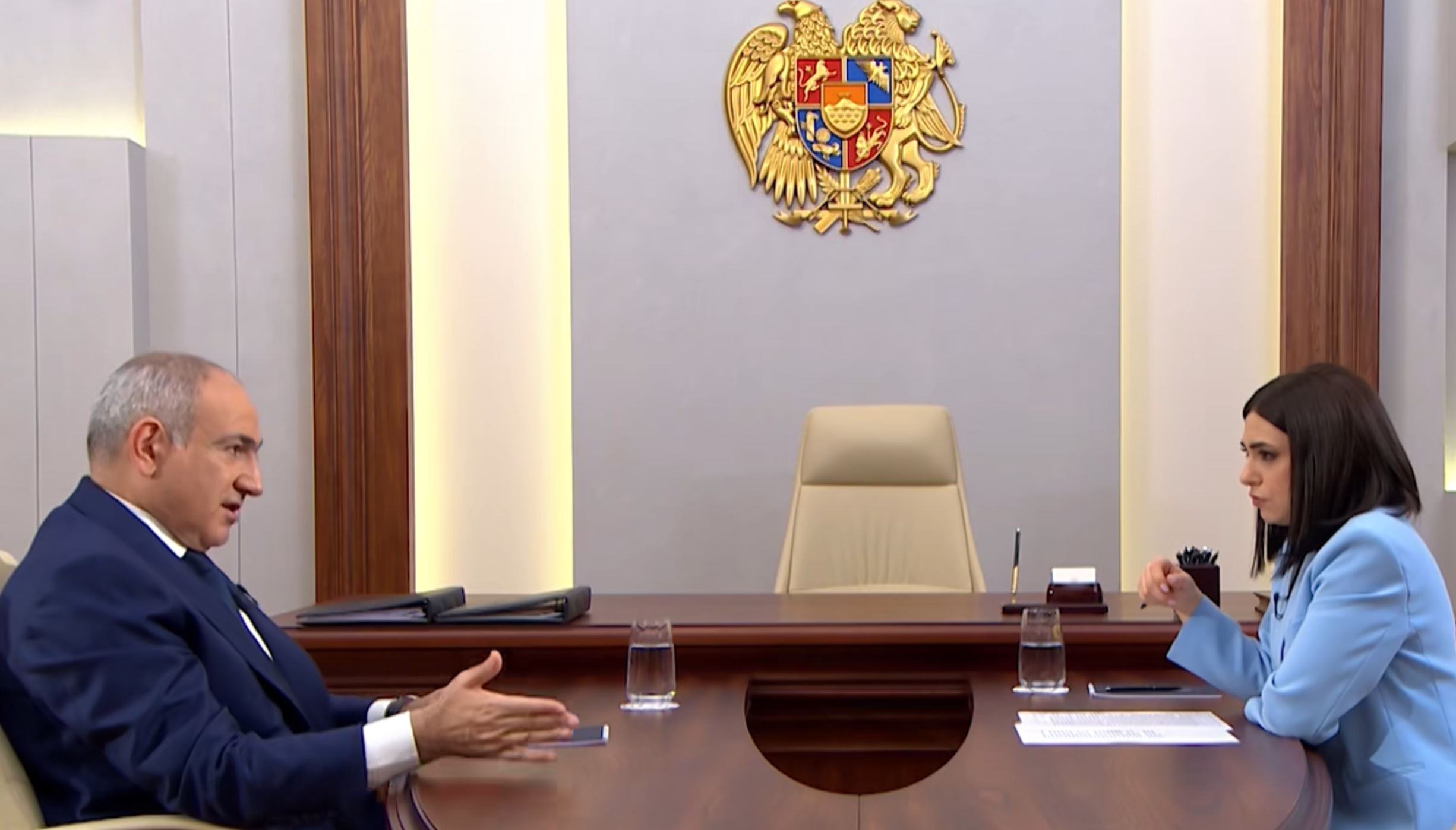Pashinyan Equates Genocide-Lost Lands to Azerbaijani Claims, Outraging Armenians at Home and in the Diaspora
- (0)

(The Armenian Report) – Prime Minister Nikol Pashinyan once again stirred controversy during an interview on Armenia’s Public Television with journalist Tatev Danielyan, delving into ongoing peace negotiations with Azerbaijan, the contested terminology of “Western Azerbaijan,” and the implications of these disputes for Armenia’s future. However, his remarks, perceived by many as dismissive of national history and sovereignty, have sparked outrage and deepened divisions at a critical moment for the country.
In a statement that shocked many Armenians, Pashinyan drew a controversial parallel between the historical term “Western Armenia” — referring to lands that were once Armenian and are now part of Turkey after the Armenian Genocide — and Azerbaijan’s provocative use of the term “Western Azerbaijan,” implying territorial claims on Armenia.
“As much as we are upset that some people use the term “Western Azerbaijan”, we, who say Western Armenia, do not think that it irritates some people,” Pashinyan said, downplaying the historical and moral weight of the term “Western Armenia.”
Critics argue that this comment undermines the sacrifices of Armenians who perished during the genocide and disregards the historical reality of Armenian lands. “This false equivalency dilutes the Armenian cause and emboldens Azerbaijan,” one analyst remarked.
Pashinyan attempted to preempt criticism, saying, “Now they will say again: another betrayal, vile scum. Today, I am in a situation and in a responsibility where I am obliged to talk to our people and show the cause and effect of connections and chains. If I don’t do that, it means that I am consciously leading the country to loss.”
However, for many, his tone and language only further inflamed tensions.
Pashinyan Equates Genocide-Lost Lands to Azerbaijani Claims, Outraging Armenians at Home and in the Diaspora
Concessions in the Name of Peace
Pashinyan also hinted at significant concessions in ongoing peace negotiations with Azerbaijan, including renouncing international claims against the country.
“If we see that we actually reach peace and sign an agreement, I think we can go for such a deal,” Pashinyan stated. He suggested a mutual agreement to relinquish claims related to past events, leaving some to question whether he was preparing to forfeit Armenia’s historical and moral rights.
“That means neither we should file claims against them, nor they against us,” Pashinyan said, offering Azerbaijan the same moral equivalence as Armenia in a conflict shaped by aggression and violence from Baku.
Many fear this approach ignores the broader historical injustices faced by Armenians, from the Nagorno-Karabakh war to ethnic cleansing and forced displacement. “These are not just legal claims but moral obligations to our people,” one critic argued.
Border Observers and Territorial Integrity
Addressing border stability, Pashinyan proposed the presence of EU observers in non-demarcated areas. Yet his remarks again drew skepticism as he downplayed the need for such observers in regions where borders are already delimited.
“We have made a counter-proposal to Azerbaijan for the presence of EU observers in non-demarcated areas. The parts of the border where it’s already delimited, there is simply no need to have an objective observer,” he said.
Territorial Claims and the Constitution
Pashinyan addressed accusations from Azerbaijan that Armenia’s Constitution includes territorial claims against it, taking a conciliatory tone that many Armenians find unacceptable.
“We do not raise the issue of amending the Constitution of Azerbaijan, because that would mean bringing the peace negotiations to a dead end,” Pashinyan said.
This remark has been widely criticized as another example of Pashinyan’s readiness to prioritize Azerbaijan’s agenda over Armenia’s interests. Analysts fear this approach could set a dangerous precedent, forcing Armenia into a weaker position in future negotiations.
Pashinyan emphasized a clause in the draft peace treaty stating that neither nation could use domestic legislation to evade treaty obligations. While he portrayed this as a step toward mutual recognition of territorial integrity, critics see it as another concession undermining Armenia’s sovereignty.
Pashinyan’s interview has reignited accusations of betrayal and capitulation. His critics argue that his approach to peace talks lacks the resolve necessary to protect Armenia’s rights and national interests, particularly as the country faces mounting pressures from Azerbaijan and Turkey.
As Armenia stands at a crossroads, many question whether Pashinyan is capable of defending the country’s interests or if his tenure will mark a turning point of irreversible decline. His remarks, seen by many as dismissive of Armenia’s historical grievances and territorial rights, leave the nation divided and uncertain about its future.



















